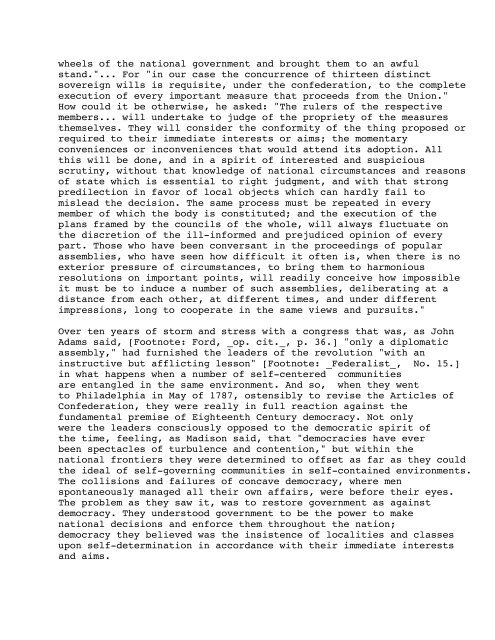PUBLIC OPINION by WALTER LIPPMANN TO FAYE LIPPMANN ...
PUBLIC OPINION by WALTER LIPPMANN TO FAYE LIPPMANN ...
PUBLIC OPINION by WALTER LIPPMANN TO FAYE LIPPMANN ...
You also want an ePaper? Increase the reach of your titles
YUMPU automatically turns print PDFs into web optimized ePapers that Google loves.
wheels of the national government and brought them to an awful<br />
stand."... For "in our case the concurrence of thirteen distinct<br />
sovereign wills is requisite, under the confederation, to the complete<br />
execution of every important measure that proceeds from the Union."<br />
How could it be otherwise, he asked: "The rulers of the respective<br />
members... will undertake to judge of the propriety of the measures<br />
themselves. They will consider the conformity of the thing proposed or<br />
required to their immediate interests or aims; the momentary<br />
conveniences or inconveniences that would attend its adoption. All<br />
this will be done, and in a spirit of interested and suspicious<br />
scrutiny, without that knowledge of national circumstances and reasons<br />
of state which is essential to right judgment, and with that strong<br />
predilection in favor of local objects which can hardly fail to<br />
mislead the decision. The same process must be repeated in every<br />
member of which the body is constituted; and the execution of the<br />
plans framed <strong>by</strong> the councils of the whole, will always fluctuate on<br />
the discretion of the ill-informed and prejudiced opinion of every<br />
part. Those who have been conversant in the proceedings of popular<br />
assemblies, who have seen how difficult it often is, when there is no<br />
exterior pressure of circumstances, to bring them to harmonious<br />
resolutions on important points, will readily conceive how impossible<br />
it must be to induce a number of such assemblies, deliberating at a<br />
distance from each other, at different times, and under different<br />
impressions, long to cooperate in the same views and pursuits."<br />
Over ten years of storm and stress with a congress that was, as John<br />
Adams said, [Footnote: Ford, _op. cit._, p. 36.] "only a diplomatic<br />
assembly," had furnished the leaders of the revolution "with an<br />
instructive but afflicting lesson" [Footnote: _Federalist_, No. 15.]<br />
in what happens when a number of self-centered communities<br />
are entangled in the same environment. And so, when they went<br />
to Philadelphia in May of 1787, ostensibly to revise the Articles of<br />
Confederation, they were really in full reaction against the<br />
fundamental premise of Eighteenth Century democracy. Not only<br />
were the leaders consciously opposed to the democratic spirit of<br />
the time, feeling, as Madison said, that "democracies have ever<br />
been spectacles of turbulence and contention," but within the<br />
national frontiers they were determined to offset as far as they could<br />
the ideal of self-governing communities in self-contained environments.<br />
The collisions and failures of concave democracy, where men<br />
spontaneously managed all their own affairs, were before their eyes.<br />
The problem as they saw it, was to restore government as against<br />
democracy. They understood government to be the power to make<br />
national decisions and enforce them throughout the nation;<br />
democracy they believed was the insistence of localities and classes<br />
upon self-determination in accordance with their immediate interests<br />
and aims.





